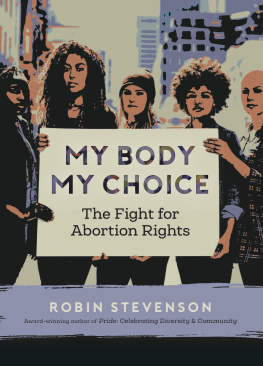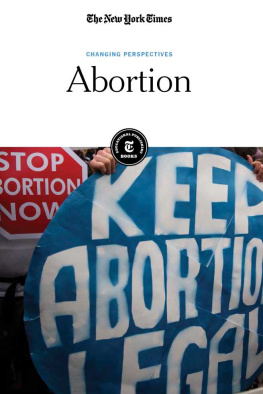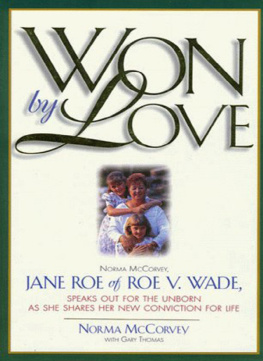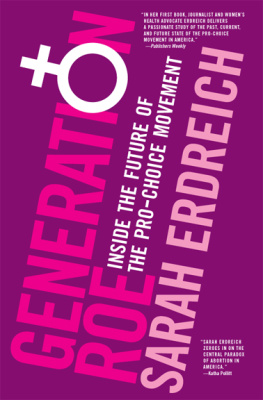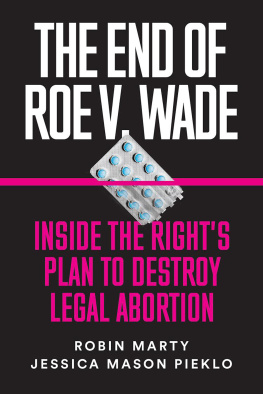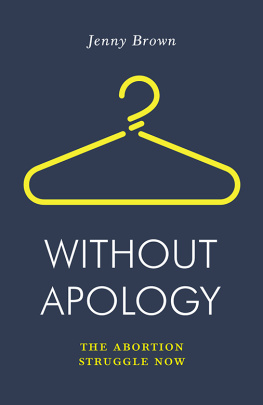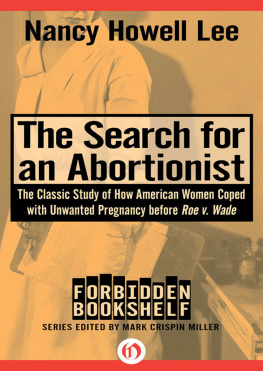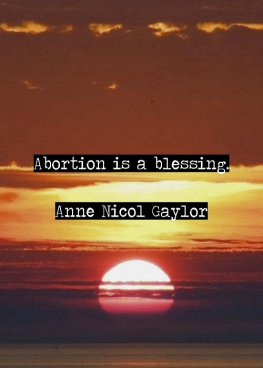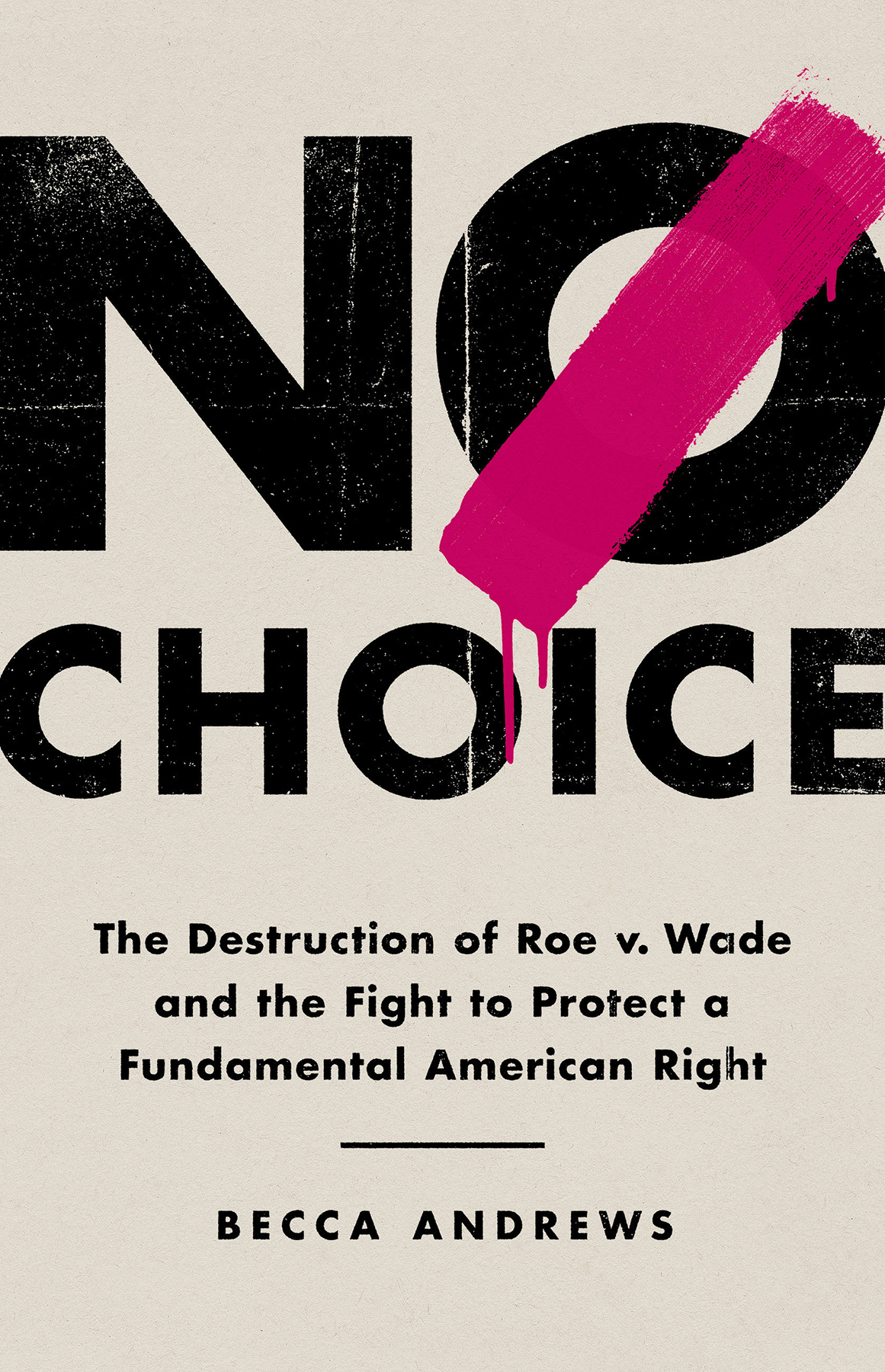A powerful, necessary, absolutely captivating account of abortion in America, situating the fight for this fundamental human right inside a much broader landscape of reproductive injustice. Anchored in richly rendered individual storiestold with grace, nuance, and compassion No Choice is required reading for the terrifying post- Roe reality in which we find ourselves. This is a book full of the history of resistance and resilience we need to understand and mobilize [for] the fight to come.
Leslie Jamison , author of The Empathy Exams and Make It Scream, Make It Burn
Highly informative, a compassionate look not just at history and current events around reproductive rights, but also the future. No Choice offers an invaluable contribution to the discourse and a reminder that abortion has a history that spans centuries. It has always happened and will always happen, even if it is not safe and legal. A post- Roe world is not a world without abortion, instead it is a world where more people die from lack of access to reproductive healthcare. This book reminds us that we have seen this in the past and we do not need to return to those horrors. The way forward is policy that centers the living and their needs, not the ideologies of those who cannot conceive of change.
Mikki Kendall , author of Hood Feminism
Andrews thoughtful and eye-opening original reporting chronicles one of the most definitive moments of our generation through the eyes of the people who lived and breathed it every day. Her thoughtfully crafted narrative tells the stories of all whove had and provide abortions with unflinching love and clear-eyed honesty. No Choice is the story of how we lost Roe , who was closest to the pain when it happened, and whose lives were forever changed because of it.
Renee Bracey Sherman , founder and executive director of We Testify
No Choice translates Beccas years of expertise in beat reporting into an incisive, meticulous, and unsugarcoated examination of how our movementand our countryfailed the South long before Roe v. Wade was overturned.
Robin Marty , author of The New Handbook for a Post- Roe America and operations director of the West Alabama Womens Center
By turns enraging and surprisingly uplifting, an intimate, depressingly timely portrait of the many people who have stood in the gap to protect abortion patients and defend reproductive justice.
Anna Merlan , author of Republic of Lies
This is required reading for every citizen of this country. Filled with brave reporting, beautiful writing, and an insistence to tell the truth about the war on women, Ill be giving this book as a gift to every woman I know.
Emily Rapp Black , author of Still Point of the Turning World and Sanctuary
Copyright 2022 by Becca Andrews
Cover design by Pete Garceau
Cover copyright 2022 by Hachette Book Group, Inc.
Hachette Book Group supports the right to free expression and the value of copyright. The purpose of copyright is to encourage writers and artists to produce the creative works that enrich our culture.
The scanning, uploading, and distribution of this book without permission is a theft of the authors intellectual property. If you would like permission to use material from the book (other than for review purposes), please contact permissions@hbgusa.com. Thank you for your support of the authors rights.
PublicAffairs
Hachette Book Group
1290 Avenue of the Americas, New York, NY 10104
www.publicaffairsbooks.com
@Public_Affairs
First Edition: October 2022
Published by PublicAffairs, an imprint of Perseus Books, LLC, a subsidiary of Hachette Book Group, Inc. The PublicAffairs name and logo is a trademark of the Hachette Book Group.
The Hachette Speakers Bureau provides a wide range of authors for speaking events. To find out more, go to www.hachettespeakersbureau.com or call (866) 376-6591.
The publisher is not responsible for websites (or their content) that are not owned by the publisher.
Editorial production by Christine Marra, Marra thon Production Services. www.marrathoneditorial.org
Library of Congress Cataloging-in-Publication Data has been applied for.
ISBNs: 978-1-5417-6839-0 (hardcover), 978-1-5417-6308-1 (ebook)
E3-20220920-JV-NF-ORI
To everyone who has overcome barrierspractical, cultural, or otherwiseto get abortion care. Even if you dont find your precise experience in these pages, your story matters.
F OR TWENTY-THREE YEARS, I was vehemently antiabortion. My parents raised my sister and me in a tiny evangelical Methodist church in our West Tennessee farming community, the sort of place where casseroles and cakes appear when something bad befalls anyone within the county lines. Our church was white but not because the community itself wasthe halls of worship in our county were always segregated. I remember the first time I heard the word abortion spoken there; I must have been thirteen, maybe fourteen years old. It happened in my Sunday school class, held in a recently constructed annex to our church that felt stark and bare compared to the warm, worn wood and ethereal stained-glass glow of the original structure. I always felt more exposed there, away from the dim, cozy sanctuary, partly due to my teenage awkwardness, partly due to the acrid smell of new paint, the blinding whiteness of barely used dry-erase boards, and the cold of the uncomfortable metal folding chairs we perched on for class. The air-conditioning, blasting against the weighty humidity of summertime in the South, licked at my bare legs and arms until my limbs were covered in gooseflesh. My family was one of a handful that were considered new members of the church, even though wed been attending for years and were devoted members, present every Sunday and well trained in the tasks that accompanied annual events, like frying pies for the fall BBQ fundraiser. Everyone else could trace their lineage in the church back decades, in some cases centuries. The last names of the deceased, inscribed upon the pews and the windows, belonged to most of the living congregants as well.
The lesson that day was being taught by a man who had always treated my family with kindness, greeting us with unrestrained warmth, a ruddy-complected young father who seemed to always be laughing or tossing his little boys in the air to make them shriek with joy. He pressed us to consider evil and harm we had never fathomed in our adolescence. It was the first time Id been asked to consider the nuances of abortion. We were high schoolersnearly grown. Some of our peers were having their first children, after all. It was time to start talking to us as adults. What did we think of abortion? I have a hazy recollection of one of my classmates declaring that the act is a murderous one. What about for victims of rape? he pressed gently. Incest? Unease bloomed in my stomach; until that moment I had never considered that anyone would get an abortion for any reason other than pure selfishnesswhen we are teenagers, we are at the height of our ego, and its difficult to comprehend much beyond our narrow interpretation of the world. I dont really recall him offering up a hard and fast opinion; I think his point was to show us that the world is a complex place, and the more you learn about it, the harder it is to apply the lessons taught in the protective halls of church or Sunday school or youth group. He was right about that.
For me, this was where the religion I grew up fervently believing in first got thorny, catching not only on my empathy but also my pragmatism. As of that morning in Sunday school, I was an absolutist, declaring that God could make any evil beautiful if a woman would simply devote her faith and her body to him. Childbirth would somehow, in my underexamined ideology, mean that all would be well. Still, something tugged at me, a knowledge that it couldnt be so simple, that life was not so straightforward, a sense that there was more to the story. Even then I understood something of the magnitude of growing another person inside oneself, of giving birth, the mechanics of which seemed truly horrifying, and of raising a child without the means and the stalwart desire to do soout of simply having no other choice. Over the years, that sense that there had to be more to this grew until I could no longer ignore it. Some of my fading certainty came out of pure stubbornness: I never could stand being told I couldnt do something, certainly not on the basis of my gender, no matter the plans of a paternalistic god I could neither see nor hear. As my world grew, as I learned to let in more people who were unlike me, I could no longer find reasons to justify my worldview as it had been formed in the halls of that country church. My upbringing, which imbued an inherently female responsibility in me to keep the peace above all else, is not fully dissolved. Even now, when relatives or acquaintances whose politics I cannot immediately identify ask me what my book is about, or what I cover as a reporter, I reply with something vague like health care or womens health, just to err on the side of preserving peace and to avoid igniting a fire I know I cannot muster the energy to put out.


